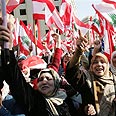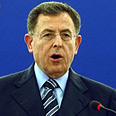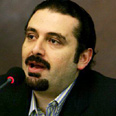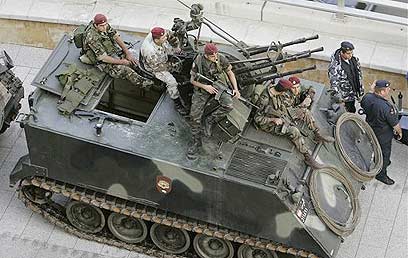


Lebanese opposition continues protest against Siniora
Some 5,000 protestors remain in tents outside government compound in Beirut, promise 'we will continue to protest until Lebanese prime minister resigns.' In meantime, anti-Syrian camp doesn't plan on crumbling under pressure from opposition, led by Hizbullah
The protestors stayed through the night in tents erected especially for this purpose. Next to them, portable bathrooms and water tanks were set up so that the thousands of protestors could remain on location for an extended period of time. The protestors promise: "We will continue to protest until the Siniora government is toppled."
The protestors called out slogans of support for Hizbullah's leader Hassan Nasrallah even as Prime Minister Fouad Siniora met with British Foreign Minister Margaret Beckett. The protestors have kept their promise not to use violence, but used their force to send a clear message to the government on Friday night.
A senior opposition official reported that the protestors imposed a curfew on the government offices, but removed it after a short while once contacts were made between the opposition leaders and Arab diplomats.
"The government received our message," said the same official. A Lebanese government official added on this issue that "two out of three of the roads leading to the government building were opened after contacts were made with opposition officials."
The coalition: Syrian-Iranian group has started its coup
Officials in the anti-Syrian coalition in Lebanon responded resolutely against the protests. "The first day of coup was started unilaterally without a political horizon," read the headlines of Lebanese newspaper al-Mustaqbal, which is owned by the head of the majority party in parliament, Saad al-Hariri.
"The Iranian-Syrian group which leads Hizbullah has started carrying out its revolution after they protested in the center of Beirut. However, the question is what will be after this protest?" asked the newspaper.
The newspaper even expressed doubt, as did al-Jazeera's senior editor Friday, on the practical, effective participation of other ethnic groups besides Shiites in the protests. "Despite Hizbullah claims that this is a multi-ethnic political move, there was practically no Christian participation," the newspaper quipped.

No violent confrontations. Lebanese army in the center of Beirut (Photo: AP)
In the meantime, it seems as though the anti-Syrian camp doesn't intend to crumble under the pressures put on them by the opposition, lead by Hizbullah. Al-Hariri emphasized in an interview with news network al-Khoura Friday night that the Lebanese government won't topple.
"Prime Minister Siniora won't fall no matter what the opposition does. This issue will be solved only through political dialogue. The key to solving the problem will be in switching President Emil Lahoud, and not in switching Siniora," said al-Hariri in the interview.
Hizbullah and their political allies are demanding a "national unity government" in which Shiites will be represented by at least a third. If this is achieved, Hizbullah will have veto power over important decisions in the Lebanese cabinet that require at least a two-thirds vote to pass.
Hizbullah would also be able to topple the government because under Lebanese law if a third of the government quits, the government automatically falls.
Opposition members, including Hizbullah, the Shiite Amal, and followers of the Maronite General Michel Aoun, decided Thursday on an official name for their political camp –the National Lebanese Opposition Forces.
This is the name they will use for all of their protest activity, activity that according to them "won't stop until the demands, at the forefront of which is the establishment of a national unity government, are fulfilled."















